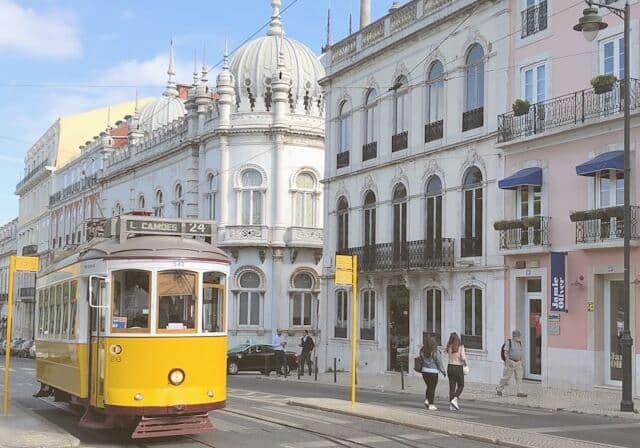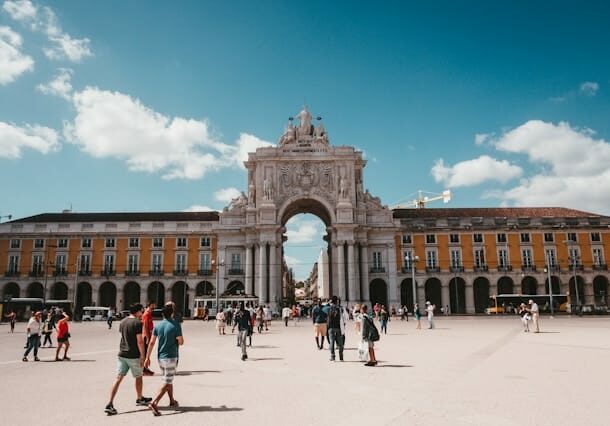Updated: December 12, 2025
There are not many cities better suited to retirees looking to enjoy their golden years in style than Lisbon. Lisbon is the perfect location for those looking for a blend of vibrant city life, a relaxed lifestyle, a low cost of living, and a warm, sunny climate.
So, why retire in Lisbon? In short, retiring in Lisbon can tick all the boxes. In this article, we’ll provide you with a comprehensive guide to why Portugal’s capital city – which never ceases to surprise – is the ideal spot to retire to.
We’ll also provide you with practical information about:
Summary
- Cost of living: Lower than the U.S., UK and most Western European capitals. Couples can live comfortably on $2,100–$2,200 (€2,000–€2,200) per month.
- Visa: Non-EU retirees typically use the D7 passive income visa, requiring stable income (pension, rental income) of ~€1,200+ per month.
- Residency path: D7 → Residence permit → After 5 years → Permanent residency or citizenship.
- Healthcare: Access to the public SNS system + affordable private insurance (€50–€100/month).
- Quality of life: Safe, walkable, English widely spoken, great weather, culture, transport, and food.
- Housing: Higher than the rest of Portugal but more affordable than most Western capitals.
Is Lisbon a good place to retire?
The Portuguese capital has long been a top European destination for travel and relocation, but is retiring in Portugal, particularly Lisbon, a good option?
While each retiree will be looking for something slightly different, most will be seeking a place to relax, enjoy their favorite activities, and to spend their well-earned retirement in a city that has everything they could need. This is what Lisbon offers.
 The appeal of Lisbon for retirees
The appeal of Lisbon for retirees
 There are many reasons to retire in Lisbon, Portugal, but below, we’ve picked out six key reasons why the Portuguese capital could be just the ticket.
There are many reasons to retire in Lisbon, Portugal, but below, we’ve picked out six key reasons why the Portuguese capital could be just the ticket.
- Pleasant climate: Lisbon residents enjoy a pleasant climate year-round, with plenty of sunshine and relatively little rain compared with other Western European capitals. Lisbon enjoys over 300 sunny days annually, making it ideal to enjoy the great outdoors for much of the year.
- Rich cultural heritage and intriguing history:History and art lovers will find tons of things to do in Lisbon, including numerous museums, art galleries, and UNESCO World Heritage sites, such as the Bélem Tower, to enjoy. There always seems to be a new art gallery opening or a trendy new restaurant to check out, meaning that life in Lisbon is always interesting.
- A thriving expat community: Many expats and retirees have come to call Lisbon home, which makes it incredibly easy to establish your own network through online groups or down at the local golf course.
- Excellent healthcare: Healthcare in Lisbon is generally excellent, with Portugal ranking in 23rd position in Numbeo’s 2025 Global Healthcare Index. There are also world-class private options in Lisbon and across the country, usually very reasonably priced when compared with other Western European countries or healthcare in the US.
- A safe country:Portugal has long been known for its low crime rates and high levels of safety, ranking in seventh position in the 2024 Global Peace Index.
- Excellent retirement villages: Lisbon offers some of the best retirement villages in Portugal where you can retire in luxury and comfort.
 Quality of life
Quality of life
Perhaps the most important reason to retire in Lisbon is the quality of life on offer.
From world-class golfing courses, an array of water sports activities, hiking and biking trails, yoga, and some of the most spectacular beaches in the world, there is always something to enjoy, no matter your interests.
The warm weather also makes it possible to make the most of the outdoor activities on offer throughout the year.
And when it comes to the food scene in Lisbon, you’ll have to experience it to believe it. Whether you are into fine dining, comfort food, international cuisine, or a mix of everything, you will not be disappointed. There’s a good reason why Lisbon was named Europe’s Best Culinary City in 2024.
 Relocation made easy
Relocation made easy
When retiring in Portugal, attractive pathways to Portuguese residency, such as the D7 Visa (also known as the Portuguese retirement visa), make relocation a breeze.
Another advantage is the fact that English is widely spoken in the capital, which means that settling into your new life will be easier compared to a country where English is not as common. Portugal’s ranking in 6th position in the English Proficiency Index 2024 is a testament to this.
 Cost of living
Cost of living
Even though the smaller cities in Portugal are even cheaper, you will find the cost of living in Lisbon to be quite affordable compared to other capitals in Western Europe, striking the perfect balance between reasonable prices and high quality.
As one of the most affordable European countries, choosing to retire in Portugal is a smart way to ensure your retirement earnings are spent wisely. From eating out in restaurants to doing your grocery shopping, you can stretch your money further here.
Lisbon is around 38 percent cheaper than both London and Washington, DC, not including rent.
Here is an estimate of the monthly costs a retired couple could expect to pay in Lisbon:
Cost | €/($) |
Rent for a one-bedroom apartment in the city center | €1,404 ($1,598 ) |
Utilities (electricity, heating/cooling, water, and garbage) | €127 ($145) |
Transportation (monthly pass) | €40 ($46) |
Gasoline (per liter) | €1.78 ($2) |
Mobile phone monthly plan | €18 ($20) |
Monthly groceries | €300 - €400 ($340 - $455) |
Dining out (three course meal for two people at a mid-range restaurant) | €55 ($62) |
Health insurance (basic cover for two people) | €80 - €160 ($90 - $180) |
Gym fees for two people | €83 ($94) |
Bear in mind that these costs will fluctuate based on lifestyle and personal spending habits, and extra expenditure on entertainment, travel, and clothing will also differ based on lifestyle choices.
Rent is usually your biggest monthly expense, which is why many retirees choose to buy property in Lisbon. It protects you from rising rental costs and, with the growing property market, it’s also a smart investment.
Where to Live in Lisbon: Top Neighborhoods
The best place to live in Lisbon is completely subjective. Some will prefer to be right in the heart of the city, close to the action, while others will be looking for some peace and quiet. In the section below, we provide you with some of the most incredible neighborhoods in Lisbon to retire to.
Note that some neighborhoods will be more expensive than others to rent or buy property in Portugal. Plus, as you move away from the city center, you should also see that prices fall. Before settling on a neighborhood, it can be a good idea to spend some time in Lisbon so that you can see firsthand which neighborhood could be best suited to you.
If you are wondering, “can foreigners buy property in Lisbon?“, you’ll be pleased to know that you’ll face no restrictions on purhcasing property.
 Campo de Ourique
Campo de Ourique
Campo de Ourique is a charming neighborhood that ticks a lot of boxes for retirees in Lisbon. It boasts lovely artisanal shops and an indoor food market, perfect for relaxed strolls on weekends.
The neighborhood is favored by many expats due to it being easy to get around to the city’s main attractions and its abundance of delightful cafés and lunch spots.
 Principe Real
Principe Real
 Principe Real, named after D. Pedro V, who was also known as the “Royal Prince”, is a beloved area for locals and expats. Extending north of Bairro Alto and renowned for its pristine charm and independent boutiques, Principe Real is also the site of the 16th-century church, Igreja de São Roque, a must-visit for history enthusiasts.
Principe Real, named after D. Pedro V, who was also known as the “Royal Prince”, is a beloved area for locals and expats. Extending north of Bairro Alto and renowned for its pristine charm and independent boutiques, Principe Real is also the site of the 16th-century church, Igreja de São Roque, a must-visit for history enthusiasts.
The area’s trendy allure and vibrant community, which includes young internationals, retirees, digital nomads, and Portuguese locals, makes it one of Lisbon’s most desirable neighborhoods. Even Scarlet Johansson recently snapped up an apartment here.
Retirees here will be able to enjoy an array of boutique shops, trendy restaurants, and breathtaking views of the River Tejo.
 Alcântara
Alcântara
Trendy and vibrant, the Alcântara Docks and Santo Amaro Dock draw weekend and evening crowds with excellent seafood restaurants housed in old warehouses, making it a favorite spot for both expats and locals.
Beyond the train tracks, Alcântara transitions into a quieter residential area with spacious houses and apartments ideal for retirees. You’ll find some of the best properties for sale in Lisbon in Alcântara, and you’ll be close to the beautiful Tagus River.
 Parque das Nações
Parque das Nações
Unlike anywhere else in Lisbon, Parque das Nações is more similar to Canary Wharf in London than other neighborhoods in the city. Situated on the Tagus River to the northeast, Parque das Nações offers a respite from the busy downtown Lisbon, away from the overwhelming crowds close to the major Lisbon tourist attractions, which makes it the perfect spot for retirees looking for a calmer spot.
Some of the best restaurants in Lisbon are located here, from top sushi restaurants to upscale Chinese restaurants. What better way to enjoy a long summer evening than an ice-cold beer with stunning views of the Tagus?
 Belém
Belém
Belém is one of the last neighborhoods within Lisbon’s municipality to the west of Lisbon, known for its historic charm, top museums, art galleries, monuments, and green spaces. Highlights include the UNESCO-listed Jerónimos Monastery, the National Archaeological Museum, and the Torre de Belém (Belém Tower).
Belém is ideal for retirees seeking a quieter lifestyle away from the city’s hustle and bustle. You are also conveniently located between Lisbon and Cascais and will be able to make the most of living on the beautiful Portuguese Riviera, with beautiful views of the River Tagus.
How to Retire in Lisbon: Residency and Visa Options
 The Portuguese government provides various residency visas to attract expats and retirees, with the D7 Visa and the Golden Visa being the most favored among those looking to retire in Portugal.
The Portuguese government provides various residency visas to attract expats and retirees, with the D7 Visa and the Golden Visa being the most favored among those looking to retire in Portugal.
Portugal stands out as one of the EU countries where securing residency is relatively easy, offering several options for non-EU citizens. For EU citizens, the process is straightforward: simply register at the local town hall.
Should you move to retire in Lisbon Portugal, you will need to get a NIF (Portugeuse tax number), likely with the help of a fiscal representative if you’re not already in the country. We also highly recommend that you open a Portuguese bank account. Using your local account will likely incur higher transaction costs, so using a Portuguese bank account will help to lower these costs.
 Portugal D7 Visa (Portugal retirement visa)
Portugal D7 Visa (Portugal retirement visa)
The Portugal D7 Visa (also referred to as the Portugal retirement visa or passive income visa) is for retirees and other expats who can financially support themselves in Portugal, essentially living off passive income.
To retire in Portugal on this visa, the Portuguese government requires applicants to have a passive income of at least €870 per month (the Portuguese minimum wage) from sources such as pension income, retirement savings, real estate, retirement income, retirement savings, or financial assets. After five years, you can apply for permanent residency in Portugal, and eventually, citizenship.
Most retirees qualify with stable passive income of around €1,200/month for one adult, plus roughly €600/month for an additional adult. This typically includes pensions, Social Security, rental income, dividends, or retirement funds.
 The Portugal Golden Visa
The Portugal Golden Visa
Introduced in 2012, the Portugal Golden Visa program is for a non-EU citizen interested in securing residency by making a minimum investment in Portugal. This visa extends to those wishing to retire in Portugal.
Investment avenues for the Portugal Golden Visa encompass qualified investment funds, job creation initiatives, or contributions to artistic and cultural projects, with a minimum investment amount of €250.000. The Portugal Golden Visa investment funds option has proved to be increasingly popular in recent years, particularly amongst American nationals.
A benefit of the Golden Visa is that the program has a short-stay requirement (seven days per year), which means that you do not need to relocate to Portugal to keep your Portuguese residency.
Although getting a residence permit in Portugal is relatively straightforward, it can get confusing if you are new to the process. Enlisting the help of the residency experts at Global Citizen Solutions is our best advice.
They will be able to guide you through all the steps, from communicating with the Portuguese Consulate and the Portuguese Immigration Agency (AIMA Portugal) all the way through to obtaining your two-year residency permit (which can be renewed).
After five years, you can also apply for permanent residency in Portugal or possibly acquire Portuguese citizenship. Once you have Portuguese citizenship and become a European citizen, you will be able to live, work, and study in any of the EU countries.
Healthcare in Lisbon
 Portugal offers universal health coverage through its publicly funded National Health Service (Serviço Nacional de Saúde, SNS), ensuring affordability for Portuguese citizens and legal residents, covering essential health needs, accidents, and illnesses.
Portugal offers universal health coverage through its publicly funded National Health Service (Serviço Nacional de Saúde, SNS), ensuring affordability for Portuguese citizens and legal residents, covering essential health needs, accidents, and illnesses.
Alongside its public healthcare, Portugal offers many private facilities and private health insurance options. If you retire in Lisbon, you’ll find private care and insurance are affordable, especially compared to the US. Private healthcare usually means shorter wait times than the public sector; plus, private healthcare professionals may speak English more commonly to cater to English-speaking expats.
Most retirees choose to combine the public SNS with private insurance for faster appointments. Private insurance in Lisbon typically costs €50–€100/month depending on age and coverage.
It’s important to note that, as part of the residency visa application process, having private health insurance is mandatory. Once residency is obtained, individuals can choose to maintain their private insurance if they so wish.
Lisbon offers a range of national health services, including hospitals, medical services, and private healthcare clinics.
If you are seeking a retirement home with a certain level of care, there are plenty of options in the country. You will also find options for assisted living in Portugal, retirement villages, and more specialized alternatives.
Climate in Lisbon
The weather in Lisbon is relatively comfortable. Winters seldom drop below 10 degrees Celsius (50 degrees Fahrenheit), and summer temperatures in August, the warmest month, typically hover around 29 degrees Celsius (84 degrees Fahrenheit).
The city’s close proximity to the Atlantic Ocean moderates temperatures well, making sure summers never get unbearably hot.
Lisbon’s rainy months are usually November and December, but even then, the rain is not constant, nor too heavy. The wind is also very mild in the city.
Integrating into the Lisbon Community
 Integrating into the Lisbon community is fairly straightforward due to two key reasons. First is the fact that the Portuguese are genuinely welcoming, with Portugal being pinpointed as one of the friendliest countries in the world, being crowned as the most welcoming country in a recent InterNations study.
Integrating into the Lisbon community is fairly straightforward due to two key reasons. First is the fact that the Portuguese are genuinely welcoming, with Portugal being pinpointed as one of the friendliest countries in the world, being crowned as the most welcoming country in a recent InterNations study.
As we’ve mentioned, the fact that English is so widely spoken also makes it easy to integrate into society, although learning some Portuguese will help you get to know your neighbors and fully integrate into Lisbon life.
Secondly, you’ll find a thriving expat community, making it easy to meet new people and form your own close network in the city. Events are regularly hosted in the city, and there is an array of sports to meet new people, such as at your local tennis club or golf course, so you should be able to integrate with few worries.
Lisbon is also one of the best cities in the world for LGBTQI+ expats: Find out more about Where Are the Best Gay Areas in Lisbon?
The capital is a massive draw for retirees due to the diverse access to retirement homes in Lisbon, Portugal. There are also many online expat groups where you’ll find a welcoming community and where you can ask questions to fellow expats who have gone through the same process as you.
Lifestyle and Activities in Lisbon
We’ve already mentioned some of the high points of living in Lisbon, but below are some of the key lifestyle perks and attractions in the Portuguese capital.
- World-class golf courses: You’ll find around 23 courses in and around Lisbon. Whether you are a seasoned professional or are just starting out, you’ll be spoilt for choice by the fantastic golf courses on the Lisbon Coast.
- Gastronomic delights: Lisbon’s culinary scene reflects its history and maritime influences, offering delicious seafood, iconic pastries like the Pastel de Nata, and traditional Portuguese dishes.
- Coastal living: Situated along the Atlantic coast, Lisbon provides easy access to stunning beaches such as Carcavelos and Costa da Caparica. Coastal towns like Cascais and Estoril along the Portuguese Riviera are perfect for getting out of the city. It’s also worth bearing in mind that Cascais could also be a top location to consider retiring to, should you be after the ultimate blend of city and seaside living.
- Cultural wonders: Lisbon is overflowing with museums and art galleries. Retirement here means the Museum of Fado, and the Museum of Art, Architecture and Technology (MAAT), are not too far away.
- Natural escapes: The Jardim da Estrela park in Lisbon offers a peaceful break from city life with its plant-filled greenhouses and waterfalls. Monsanto Forest Park, a natural park on the doorstep of Lisbon, also offers lush tree-covered spaces with lots of shaded areas for relaxing on warm days.
Getting Around and International Travel
Lisbon boasts an efficient public transportation network encompassing buses, trams, trains, and the iconic yellow trams.
The metro system provides comprehensive city-wide connectivity, while trains offer convenient and affordable travel to other regions of the country, including Faro in the Algarve and Porto, the jewel of Northern Portugal.
You can also take the train to Cascais along the Portuguese Riviera in less than an hour, while Lisbon’s airport facilitates seamless international travel for frequent flyers.
Taxes For Retirees in Lisbon
 The general rule if you retire in Portugal is that if you are a taxpayer, all your income is taxed, including pension and worldwide income.
The general rule if you retire in Portugal is that if you are a taxpayer, all your income is taxed, including pension and worldwide income.
If you spend more than 183 days in Portugal during a tax year, you are considered a tax resident and must file a tax return. There are also tax laws in place to prevent double taxation.
You can see our full guide to taxes in Portugal, in order to understand which taxes you may encounter when retiring in Lisbon but seeking advice from a tax professional is also recommended.
Portugal has also introduced a new Tax Incentive for Scientific Research and Innovation (IFICI), more commonly known as the NHR 2.0 because it was designed to replace the previous NHR scheme. The new tax incentive program offers significant tax benefits for those who qualify.
Bottom Line
Is Lisbon a good place to retire? After exploring the high quality of life, affordable cost of living, rich Portuguese culture, quality healthcare, strong property market, and sunny climate, all signs point to Lisbon being one of the best places to retire.
Libon truly ticks all the boxes for a peaceful yet exciting retirement. And the best part is you can start your journey moving to Lisbon today.
You can personally consult with a real estate agent in Lisbon for a more detailed outlook on the property market and recent trends.
Goldcrest: How We Can Help
Goldcrest is the first buyer’s agent in Portugal, based in Lisbon, Porto, and the Algarve. We provide local insights and impartial advice on your Lisbon real estate investment and have helped hundreds of expats secure their dream home in Portugal. From scouting out the perfect property through to property acquisition and aftercare, we guide you throughout the entire process.
Should you be seeking out your perfect property to retire in Lisbon, Portugal, we’d be more than happy to help. The buying process can be complicated. With an experienced real estate professional in your corner, we aim to make the process as stress-free as possible, providing a service tailored completely to your specific requirements.
Frequently Asked Questions about Retiring in Lisbon Portugal
Is Lisbon, Portugal, a good place to retire?
Yes, retiring in Lisbon offers a pleasant climate, rich culture, high-quality healthcare, and a relaxed lifestyle. The city is also known for its affordability compared to other Western European capitals.
What is the cost of living if you retire in Lisbon Portugal?
The cost of living for retirees in Lisbon is relatively low, but prices have been increasing in recent years. On average, a retired couple can live on about €2,000 to €3,500 per month, with the range depending on where in the city you choose to live and your lifestyle.
What healthcare services are available for retirees in Lisbon?
Lisbon has excellent healthcare services, with both public and private options. Public healthcare is generally excellent, but there are also private services available where you will likely get an appointment quicker. Compared to other countries, particularly the USA, you will find that healthcare is much more affordable in Portugal. You could also qualify for social security in Portugal, which will be handy when you make the country your permanent residence. However, you can still benefit from your US Social Security.
Are there English-speaking communities or expat groups in Lisbon?
Yes, Lisbon hosts several English-speaking communities and expat groups, making it easier for retirees to connect and socialize. Organizations like InterNations and MeetUp often have events and gatherings for expats in Lisbon.
If you choose to retire in Portugal, Lisbon, along with the Algarve, is your best bet for finding communities and activities with other English speakers. From golf to yoga, partaking in activities is also a good way to establish your network in Lisbon.
What transportation options are available for retirees in Lisbon?
Lisbon offers extensive transportation options, including buses, trams, metro, and trains. The city is also pedestrian-friendly, and taxis and services like Uber and Bolt are widely available, making it easy for retirees to get around.
What are the popular neighborhoods for retirees in Lisbon?
Popular neighborhoods for retirees in Lisbon include Campo do Ourique, Príncipe Real, and Belém, known for their charm, history, and amenities. Other sought-after areas are Estoril and Cascais, which offer beautiful coastal living just outside the city.
How safe is Lisbon for retirees?
Lisbon is generally very safe for retirees, with low crime rates and a welcoming atmosphere. The city is known for its friendly locals and vibrant communities, ensuring a secure environment for retirees.
Are there recreational activities or social clubs for retirees in Lisbon?
Yes, Lisbon offers numerous recreational activities and social clubs for retirees, including golf, tennis, yoga, hiking, cultural tours, and language classes. Various expat groups and organizations also provide social events and gatherings.
What visa options are there for retiring in Lisbon Portugal?
Retirees can apply for the D7 Visa, also known as the Retirement Visa, which is designed for non-EU citizens who have sufficient passive income. This visa allows retirees to reside in Portugal and enjoy its benefits. The Golden Visa is another option whereby you can secure residency in Portugal in return for an investment in the country.
How to retire in Lisbon Portugal?
Enquiring about how to retire in Lisbon, Portugal, is common among non-EU nationals looking to settle in an affordable European country. If you are considering retiring in Lisbon Portugal, you will need to secure a residency permit, with popular options being the D7 Visa and the Golden Visa. If you are a European Union national, you will have no issues retiring to Portugal, and you simply need to register at the local town hall.
Can I retire in Portugal as a US citizen?
Yes, you can retire in Portugal as a US citizen. You’ll need to apply for a residency visa, such as the D7 Visa, which is ideal for retirees with a stable passive income. Once you obtain your residency permit, you can retire to the country with ease.
What are the disadvantages of living in Lisbon?
While Lisbon offers a great quality of life, there are a few downsides. These include rising rental and housing costs, occasional bureaucracy, and traffic congestion in the city center. Additionally, while many locals speak English, language barriers can still be a challenge in certain situations.